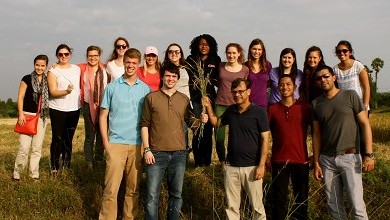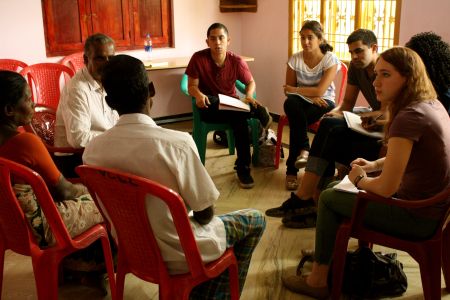by Kari A. Wozniak

Group photo of 2014 India trip participants, Chennai, India
Credit: ADM Institute/Kari Wozniak
When Casey Dollinger’s father heard of her plans to travel to India, he was concerned. Not just in the typical fashion a father might worry about their student’s study abroad trip. She wasn’t ready, he felt, to fully grasp the significance of postharvest operations in agriculture in just 10 days. Casey’s dad is an Illinois farmer, his family a producer of corn and soybeans for many years. Before she set off on January 5th with her professor and a small group of her peers, he made sure to explain to Casey as much as he could about the processes and challenges involved with postharvest management.
Even with an agricultural background, the Illinois junior in supply chain management (SCM) and accounting could not have foreseen all that she would learn in India. Over the course of the eight days on the ground, Casey and her peers traveled to many sites in southern and northern parts of the country. The students visited farms; on different occasions they were able to observe fieldworkers planting and harvesting crops. They also visited grain mills, storage facilities, wholesale markets, NGO offices, and even a university campus specialized in environmental research. The purpose of the trip, led by SCM program director Professor Udatta Palekar, was for the students to observe and understand the extent of postharvest losses in agricultural supply chains.

Pictured: Elyse Kelly & Samer Ijaz, Junior and Senior in Supply Chain Management at Illinois Credit: ADM Institute/Kari Wozniak
Unlike Casey, most of the students, a mix of SCM and Agricultural and Biological Engineering undergrads, do not come from an agricultural background, making the opportunity to study agricultural and agribusiness issues in another country a unique addition to their academic experience. The trip’s packed itinerary included observations of several stages of commodity supply chains, and their discussions throughout focused on efficiency, an important topic in their fields of study. At the largest wholesale market in Asia, Professor Palekar explained how and why vendors of paddy and flowers often experience profit losses at the point of sale. He showed the students examples of technical limitations and logistical issues in grain processing, transportation, and storage. One day the group toured the sites of two large-scale grain storage facilities, one a public-private partnership and the other a government facility. Drawing on comparisons between the two, Palekar taught his students about the influence of supply chain actors like commodity agents, and how the powerful relationships they hold affect supply chain management.
Beyond observational learning, the trip provided ample opportunity for interaction with Indian locals. Students interviewed smallholder farmers, NGO representatives, extension officers, facility operators, government officials, researchers, and others. They asked questions about their livelihoods, their practices, and about issues they face in their respective roles. In addition to gaining a deeper understanding of Indian agriculture, they also gathered vital information about how supply chain actors perceive and deal with issues of postharvest loss that they will share with the ADM Institute in a final trip report. The interviews are just one example of the on-the-ground learning that takes place on the trip, an aspect the students found very meaningful. At many of the facility sites, students eagerly pointed out technologies and processes that they had studied in class in use by operators.

Students interviewed many local actors about agriculture
and business practices. Credit: ADM Institute/Kari Wozniak
Casey’s father was right to tell her that there is a great deal to know about postharvest management. As the students observed, issues of postharvest loss are incredibly complex. They learned that solving these issues requires collaboration among a diverse group of stakeholders, including students like them. Despite their short time in the country, the students were successful in critically analyzing the issues, as well as sharing their perspectives and ideas with international audiences via blog and social media posts. For postharvest loss, which is still largely unknown or vaguely understood by many around the world, this additional effort by the students is an important contribution to a broader ongoing dialogue.
This year’s trip marks the third time the ADM Institute for the Prevention of Postharvest Loss, in collaboration with the John Deere Foundation, has supported this study tour in India. Each year, the trip continues to have significant educational and personal impact on Illinois students. This trip was also the first to involve on-site communications, which provided the students with the unique opportunity to make their own impact through raising awareness for an important global issue while meaningfully contributing to the process of solving it.


No comments yet.